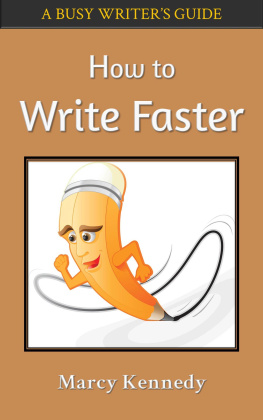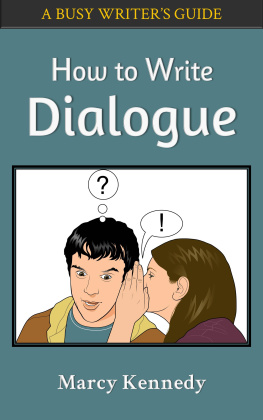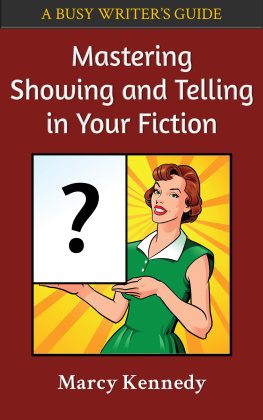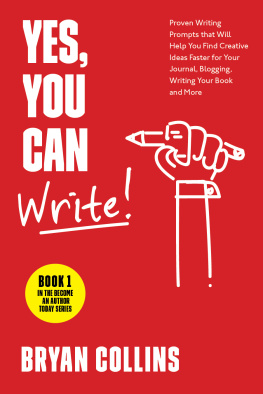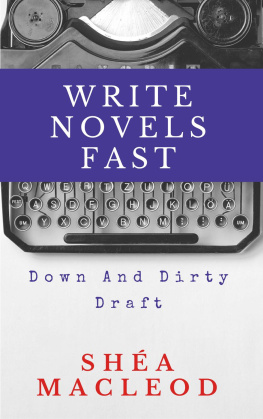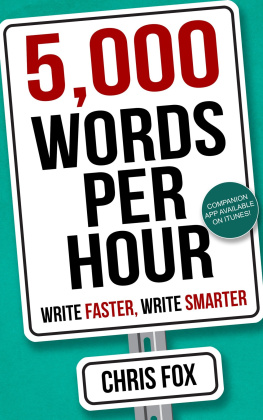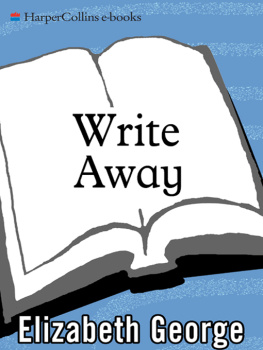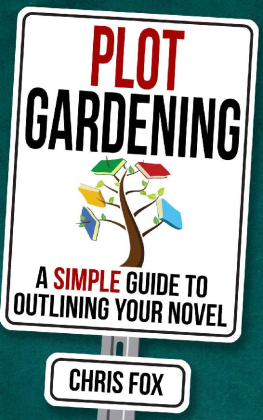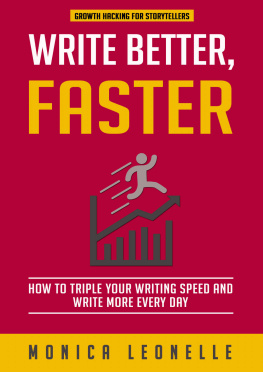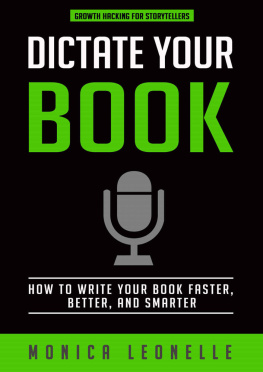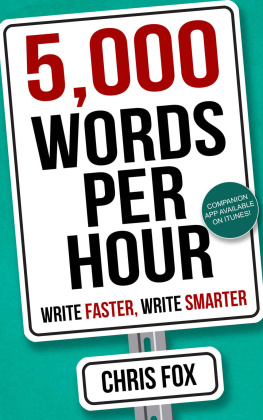Marcy Kennedy - How to Write Faster
Here you can read online Marcy Kennedy - How to Write Faster full text of the book (entire story) in english for free. Download pdf and epub, get meaning, cover and reviews about this ebook. year: 0, genre: Home and family. Description of the work, (preface) as well as reviews are available. Best literature library LitArk.com created for fans of good reading and offers a wide selection of genres:
Romance novel
Science fiction
Adventure
Detective
Science
History
Home and family
Prose
Art
Politics
Computer
Non-fiction
Religion
Business
Children
Humor
Choose a favorite category and find really read worthwhile books. Enjoy immersion in the world of imagination, feel the emotions of the characters or learn something new for yourself, make an fascinating discovery.
- Book:How to Write Faster
- Author:
- Genre:
- Year:0
- Rating:4 / 5
- Favourites:Add to favourites
- Your mark:
- 80
- 1
- 2
- 3
- 4
- 5
How to Write Faster: summary, description and annotation
We offer to read an annotation, description, summary or preface (depends on what the author of the book "How to Write Faster" wrote himself). If you haven't found the necessary information about the book — write in the comments, we will try to find it.
How to Write Faster — read online for free the complete book (whole text) full work
Below is the text of the book, divided by pages. System saving the place of the last page read, allows you to conveniently read the book "How to Write Faster" online for free, without having to search again every time where you left off. Put a bookmark, and you can go to the page where you finished reading at any time.
Font size:
Interval:
Bookmark:

A Busy Writer's Guide
Marcy Kennedy
Copyright 2013 Marcy Kennedy
Smashwords Edition
How to Write Faster: A Busy Writers Guide
First Edition
All rights reserved.
This e-book is licensed for your personal enjoyment only. No portion of this book may be reproduced or transmitted in any form or by any means, electronic or mechanical, including photocopying, recording, or by any information storage and retrieval system without written permission from the author, except for the inclusion of brief quotations in a review. This e-book may not be re-sold, as a used file or otherwise, and may not be given away to other people. Purchase and download is a one-time final use of this product. If youre reading this book and did not purchase it, or it was not purchased for your use only, then please purchase your own copy. Thank you for respecting the hard work of this author.
Editor: Christopher Saylor
Published September 2013 by Tongue Untied Communications
ISBN: 978-0-9920371-1-6
In the second chapter of Lewis Carrolls Through the Looking Glass , Alice and the Red Queen run as fast as they can until Alice is out of breath and exhausted. When they stop, Alice comments on how they seem to be under the same tree as when they started.
The Red Queen cant understand Alices confusion.
Of course it is, said the Queen: what would you have it?
Well, in our country, said Alice, still panting a little, youd generally get to somewhere else if you ran very fast for a long time, as weve been doing.
A slow sort of country! said the Queen. Now, here, you see, it takes all the running you can do, to keep in the same place. If you want to get somewhere else, you must run at least twice as fast as that!
Thats how I felt for years, and how I know many other writers feel as well.
Do you know anyone who doesnt feel rushed, spread too thin, and over-worked?
From her years working in palliative care, nurse Bronnie Ware collected the top five regrets of the dying. I wish I didnt work so hard made the list. She found that people wished theyd spent more time with their children and significant others rather than on the work treadmill. Also on the list was I wish Id stayed in touch with my friends. Due to a busy lifestyle, many people neglected their most valuable friendships and regretted it once it was too late.
Two of the ways Ware identifies as key to avoiding these regrets are making conscious choices and simplifying our lifestyles.
For writers, I believe this means making the best use of the time we have and setting (and keeping) clean work-life boundaries.
Do you really want to be an Ill sleep when Im dead person? Or do you want to be the kind of person who reaches their retirement with amazing memories to not only write about but also to tell their grandkids about when they come to visit?
I want to be the latter. Thats why I went on a quest to figure out how to increase my word count. If we can write better, faster, we can have more time to spend on the things that are really going to matter when were dying.
This isnt about being able to write 8,000 to 10,000 words a day. Maybe youll be able to do that, but not everyone can, and I think its foolish for us to put that kind of pressure on ourselves. Using the techniques described in this book, I went from writing 250 words an hour to 2,000 words an hour. Your mileage might vary, but as long as you increase your word count, you should consider it a success.
This isnt about being able to write a book in a week or even two weeks. Im one of the people who thinks its a load of crap that writers are expected to work 1214 hours a day, 7 days a week, to produce multiple books a year just to make a living. (According to an article in the New York Times in May 2012, in the e-reader era, one book a year is slacking.) A career in writing is a marathon, not a sprint. Do you know what happens to a person who tries to run a marathon as if it were a sprint? Their mind might be willing, but their body gives out.
This book is about increasing your word count in a way thats sustainable . You dont want to just write faster for a week. You dont want to write so fast you burn out creatively. You want to consistently hit higher word counts and produce writing thats worth keeping.
This book isnt intended for new writers who are still learning the basics of craft.
One of my favorite quotes comes from Marcus Fabius Quintilianus, a Roman rhetorician from circa 65 AD. He said, Write quickly and you will never write well; write well, and you will soon write quickly.
The principle behind this is that, the faster you write, the less able you are to focus on improving what youre writing. Its useless to write a lot of words if you never get better. You cant get better simply by writing a lot. You also need to study craft and study well-written books, then you need to consciously work at applying what youve learned to your own writing. To do this, you sometimes need to write more slowly until youre comfortable with each new element.
If you wanted to learn to play basketball, you wouldnt get better by trying to dribble while running across the court and trying to make a shot if youd never even held a basketball before. Youd learn how to dribble standing in one place. Youd learn how to shoot standing in one place. Once you learned the basics, you could then put them into motion.
The same is true for musicians. When youre learning an instrument, you learn the names of the notes and their timing. You learn the fingering. You play scales and simple songs. And when you first play a song thats challenging for you, you dont try to play it at tempo. You play it slowly to make sure you master the timing, fingering, and dynamics, and then you slowly bring it up to speed.
Writing is no different.
So if youre a new writer whos still struggling with the craft, I recommend you purchase other books in the Busy Writers Guide series first. Come back to this book after youve built yourself a solid foundation.
If youre ready to learn how to write faster, read on
Endnotes:
Carol, Lewis. "Chapter II: The Garden of Live Flowers." Through the Looking Glass . Available from http://www.gutenberg.org/files/12/12-h/12-h.htm
Creatives arent known for their focus.
Because were innately curious, were distracted by every shiny thing that crosses our path.
We can fall down the Internet rabbit hole in the name of research and suddenly all our writing time is gone.
Facebook, Twitter, emailall the ways we connect to our online friends and build our platforms call our names.
Sometimes we even try to multitask and write while watching TV.
But the foundation to faster writing is eliminating all distractions.
So in this chapter were going to focus on five tips for staying focused.
Its pretty much guaranteed that, as soon as you start to work, a million things will come into your head. Things you need to do. Ideas for different stories.
You need to get them out so you can focus. Jot them down in a notebook and go right back to writing.
Not only will this help you focus, itll also reduce your stress level.
I mean that literally. Disconnect your computer from the Internet.
Font size:
Interval:
Bookmark:
Similar books «How to Write Faster»
Look at similar books to How to Write Faster. We have selected literature similar in name and meaning in the hope of providing readers with more options to find new, interesting, not yet read works.
Discussion, reviews of the book How to Write Faster and just readers' own opinions. Leave your comments, write what you think about the work, its meaning or the main characters. Specify what exactly you liked and what you didn't like, and why you think so.

